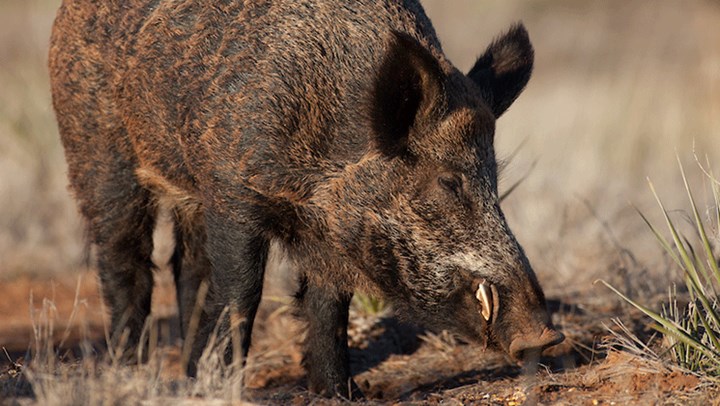
by Brian McCombie - Friday, April 6, 2018

Many media outlets, including this NRA Hunters’ Leadership Forum website, have documented the problems feral hogs are causing for America’s farmers and ranchers, literally costing them tens of millions of dollars annually. The destructive wild porkers eat crops, destroy pastures and undermine fences, levees and ranch roads. They also can spread diseases to domestic livestock.
Somewhat under the radar, though, feral hogs have taken their detrimental ways to new venues: our cities and suburbs. Hogs are creating major difficulties in many residential areas of the Southeast and Texas, and hunting and hunters can help with this pesky problem.
In Decatur, Ga., part of the Atlanta Metropolitan Area, wild pigs are digging up lawns and flower beds. They even have become a driving hazard. Local residents are pretty much on their own with this thorny problem, WTVM.com reported, as “Dekalb Animal Control and the Department of Natural Resources told…[them] they don’t trap wild boar.”
Scott Sellers, a local firefighter and a bow hunter, has volunteered to try trapping the pigs. If that doesn’t work, he has also offered his services as a hunter.
"It’s a bow-only county," Sellers explained. "There are no firearms allowed to hunt here. So, bow hunting the pigs would be an option."
Decatur is just the tip of the iceberg, in and out of Georgia. In state, as WSB-TV2 Atlanta reported, feral hogs have done approximately “$150 million in damage in the state of Georgia [in recent years], about a third of that in residential areas.”
In Denton, Texas, north of Dallas, the greens on the Timberlinks Golf Club are ravaged by nocturnal hogs. According to NBCDFW.com, regular “herds” of wild hogs have been documented on camera in and around the golf course, usually at night. And pigs being pigs, they are all about the digging.
“It looks like it's been plowed,” one Timberlinks member said of a fairway. “Ground’s all torn up from where they've been rooting around."
Hogs are a real problem in Dallas, too, as they root across Texas. So much so, that Dallas city leaders recently approved a three-year $347,000 contract with a trapping company that corrals pigs on city-owned land and sells them to a meat-processing plant in Fort Worth.
Media outlets from the Dallas Morning News to the Denton Record-Chronicle report that the pigs cost Texans about $52 million in agricultural damage alone every year. As Brett Johnson, an urban biologist for the city of Dallas, notes, "If you're not already dealing with pigs, you're going to," considering the Texas Parks and Wildlife Department says pigs are documented in every county.
Interestingly, in all the above-cited news stories, the possibility of hunting the hogs is mentioned—and then immediately dismissed. Most of these suburban and urban areas, it is true, have laws against discharging firearms within municipality limits. But the reporters and the local government officials they interview all seem to be unaware that Mr. Sellars in Decatur, Ga., and his bow-hunting brothers and sisters could be of use in many of these developed areas.
As NRAHLF.org recently reported, suburban and urban deer hunts across the country are having notable successes in keeping local deer herds in check. And the hunting in these cities and ‘burbs is strictly archery.
Trapping can be effective. But it’s not free. Either homeowners pay the trappers directly or tax payers do so, as is happening in Dallas. Meanwhile, as NRAHLF.org noted, the urban and suburban deer hunts pretty much pay for themselves. Usually, hunters apply to be considered for these hunts and then, if chosen, pay a nominal administrative fee. In many cases, the venison harvested is also donated to local food banks.
It’s a three-way win—for hunters, those in need of help and taxpayers.
Couldn’t hunters do the same in urban and suburban areas being hit hard by destructive hogs? It would seem so. Urbanites not familiar with hunting might resist this approach. But hunting could very well make sense to these people, especially if hunters can explain to them the dollars-and-cents benefits of hunting!
E-mail your comments/questions about this site to:
[email protected]
